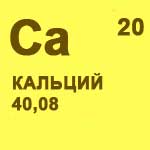Calcium — properties and application, role in the body, contraindications, dietary sources of calcium
Calcium is a substance best known as a remedy for osteoporosis, but, obviously, it is also able to lower blood pressure and prevent colon cancer. Unfortunately, many adults receive no more than half of the recommended daily dose of calcium.
Calcium — what is it
 Calcium. |
Calcium in the human body contains 1-1.2 kg and almost 99% — in bones and teeth, but it is continuously required for functions such as blood clotting and muscle contraction. Bones are constantly being rebuilt, and part of their calcium is inevitably lost with urine, so its entry into the body is necessary to maintain the strength of the skeleton. When he grows up (in childhood, youth), the needs for this metal are especially great. They are also increased in pregnant women (fetal bones are formed) and nursing mothers who intensively secrete calcium with milk, which ensures rapid growth of the child. Accordingly, dairy products remain the main food source of this metal. Its deficiency can be compensated by taking various salts — carbonate, citrate, malate, gluconate or calcium lactate.
Properties and role of calcium in the body
Calcium provides strength of bones and teeth. In its ionized form, by activating enzymes and affecting the permeability of cell membranes, it ensures the flow of many vital processes, including blood clotting, muscle contraction, nerve conduction, and hormone release. The body automatically compensates for the possible lack of ions due to bone tissue. As a result, chronic lack of calcium from the outside threatens to reduce its density. Bones become porous and brittle: osteoporosis develops, fraught with ordinary fractures and gradual destruction of the spine with all the consequences that follow from this — not only for posture.
Prevention
Our bones normally stop growing and begin to slowly decrease their density by about 30 years (and in some even earlier). However, studies show that sufficient intake of calcium in food and/or supplements helps to avoid osteoporosis even after 65 years.
The main use of calcium
Calcium binds bile acids in the digestive tract (some of them are toxic). This is important for protection against colon cancer. A menu rich in calcium, vegetables and fruits reduces blood pressure no worse than some antihypertensive medications. In any case, they should be replaced with a diet or supplements only with the consent of the attending physician.
| Latest news |
| Judging by the results of 33 studies with 2,600 participants, potassium has a positive effect on blood pressure. For example, an additional daily intake of 2340 mg of this element (with food and/or in the form of supplements) leads to a small but important decrease in it. Moreover, the decrease is most pronounced in those who already suffer from hypertension. |
Our needs
The recommended amount of calcium for adults is 1000 mg. During pregnancy and breastfeeding, it increases to 1200 mg/day, and women at the age of 55 and men after 65 need to increase this dose to 1500 mg/day.
Lack of calcium. Chronic calcium deficiency threatens osteoporosis, and a low level of its ions in the blood can provoke muscle spasms.
Excess calcium. Apparently, even a significant excess of the recommended daily allowance (up to 1500 mg/day) does not harm healthy people. However, the increased intake of calcium into the intestine makes it difficult to assimilate zinc, magnesium and especially iron. It can also stimulate the formation of kidney stones. If calcium carbonate supplements cause bloating or constipation, they can be replaced with citrate preparations calcium.
| Do you know? |
| For the absorption of calcium, vitamin D is necessary, synthesized in our skin in the sun. Just in case, some supplements include both of these substances at once. |
Indications for the use of calcium preparations
• Prevention of osteoporosis, osteomalacia (demineralization of bones), tooth decay.
• Prevention of disorders of muscle contractility, nerve conduction, blood clotting.
• Prevention of colon and prostate cancer.
• Arterial hypertension.
Methods of application of calcium preparations
• Doses
 100 g of boiled broccoli gives an adult 10% of the daily norm of calcium. |
Try to provide a daily allowance mainly at the expense of food. In supplements, the concentration of calcium varies, so calculate their intake according to the instructions on the package.
• Reception scheme
To make this element better absorbed, take supplements in doses not exceeding 500-600 mg, be sure during meals, especially when it comes to calcium carbonate.
Release form
• Tablets
• Capsules
• Powder
• Drinking solution
| For your information |
| Do not take calcium preparations made from dolomite, oyster shells or bone meal: they may contain significant amounts of lead. The body's ability to synthesize vitamin D in the sun decreases with age, and therefore it is recommended to introduce 10 micrograms of this vitamin into the daily diet. This can be achieved by taking supplements containing both calcium and vitamin D. We absorb only a fraction of the calcium present in spinach. Spinach contains a lot of oxalates that bind calcium and limit its availability to the body. Oxalates do not interfere with the absorption of calcium from other foods. |
Contraindications to the use of calcium preparations
• For diseases of the kidneys or parathyroid glands, take calcium only with the permission of a doctor.
• Calcium reduces the effectiveness of certain medications, for example tetracycline antibiotics, digitalis derivatives (for heart failure), some diuretics.
| Caution! |
| • If you are being treated with medications, take any vitamins and minerals only with the permission of a doctor. |
Food sources of calcium — foods with a high content of calcium
Any dairy products, even low-fat ones, are the richest in calcium. There is also a lot of it in mineral water, citrus fruits, cabbage, broccoli, almonds, canned fish (if you eat them with bones).
To the section «Mineral substances — descriptions, properties and applications»
•••••••••
